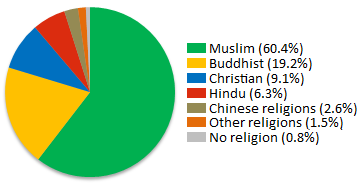|
Religion In Malaysia
Islam is the state religion of Malaysia, as per Article 3 of the Constitution. Meanwhile, other religions can be practised by non-Malay citizens of the country. In addition, per Article 160, one must be Muslim to be considered Malay. As of the 2020 Population and Housing Census, 63.5 percent of the population practices Islam; 18.7 percent Buddhism; 9.1 percent Christianity; 6.1 percent Hinduism; and 2.7 percent other religion or gave no information. The remainder is accounted for by other faiths, including Animism, Folk religion, Sikhism, Baháʼí Faith and other belief systems. The states of Sarawak and Penang and the federal territory of Kuala Lumpur have non-Muslim majorities. Numbers of self-described atheists in Malaysia are few as renouncing Islam is prohibited for Muslims in Malaysia. As such, the actual number of atheists or converts in the country is hard to ascertain out of fear from being ostracised or prosecution. The state has come under criticism from human ... [...More Info...] [...Related Items...] OR: [Wikipedia] [Google] [Baidu] [Amazon] |
